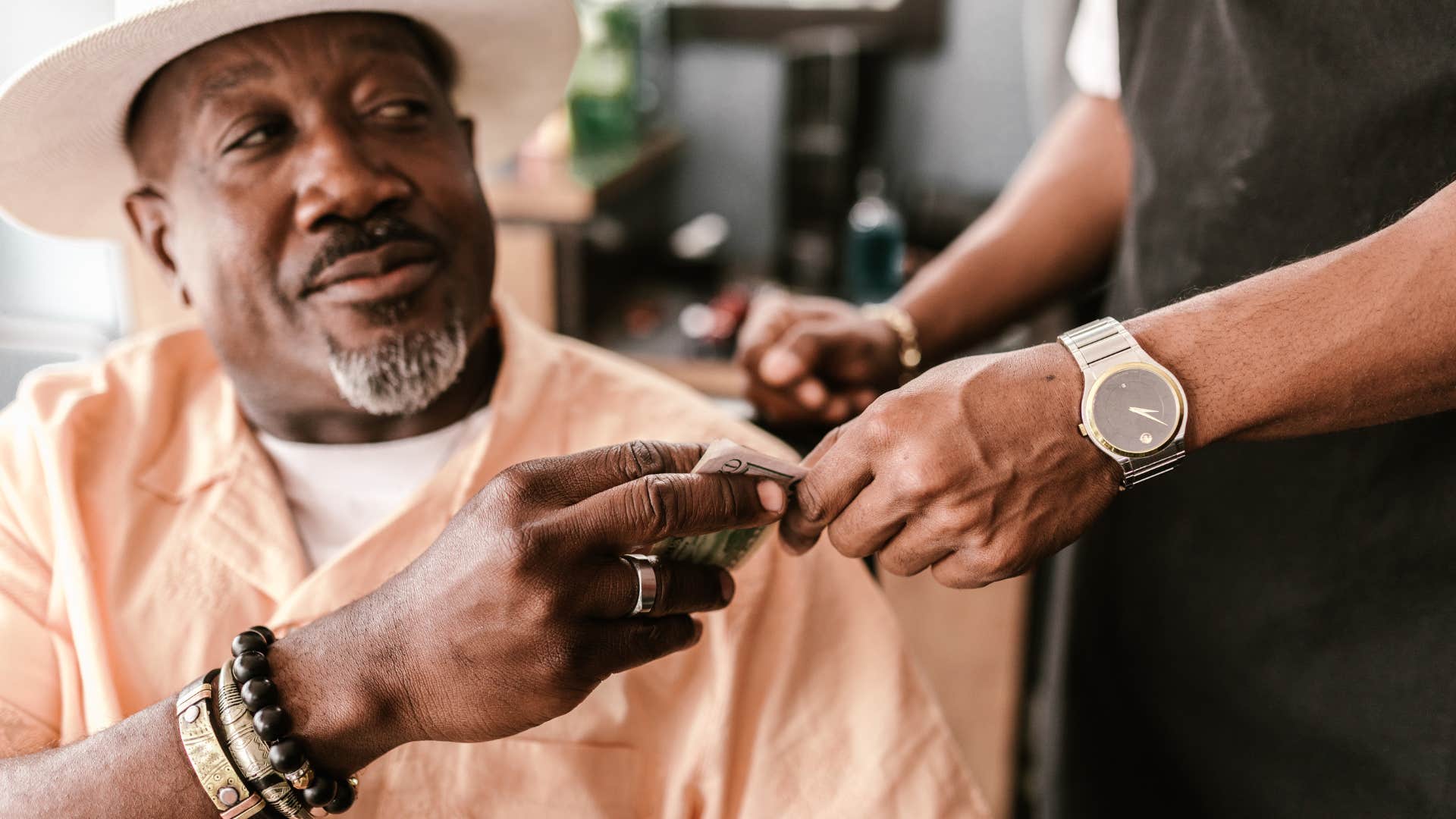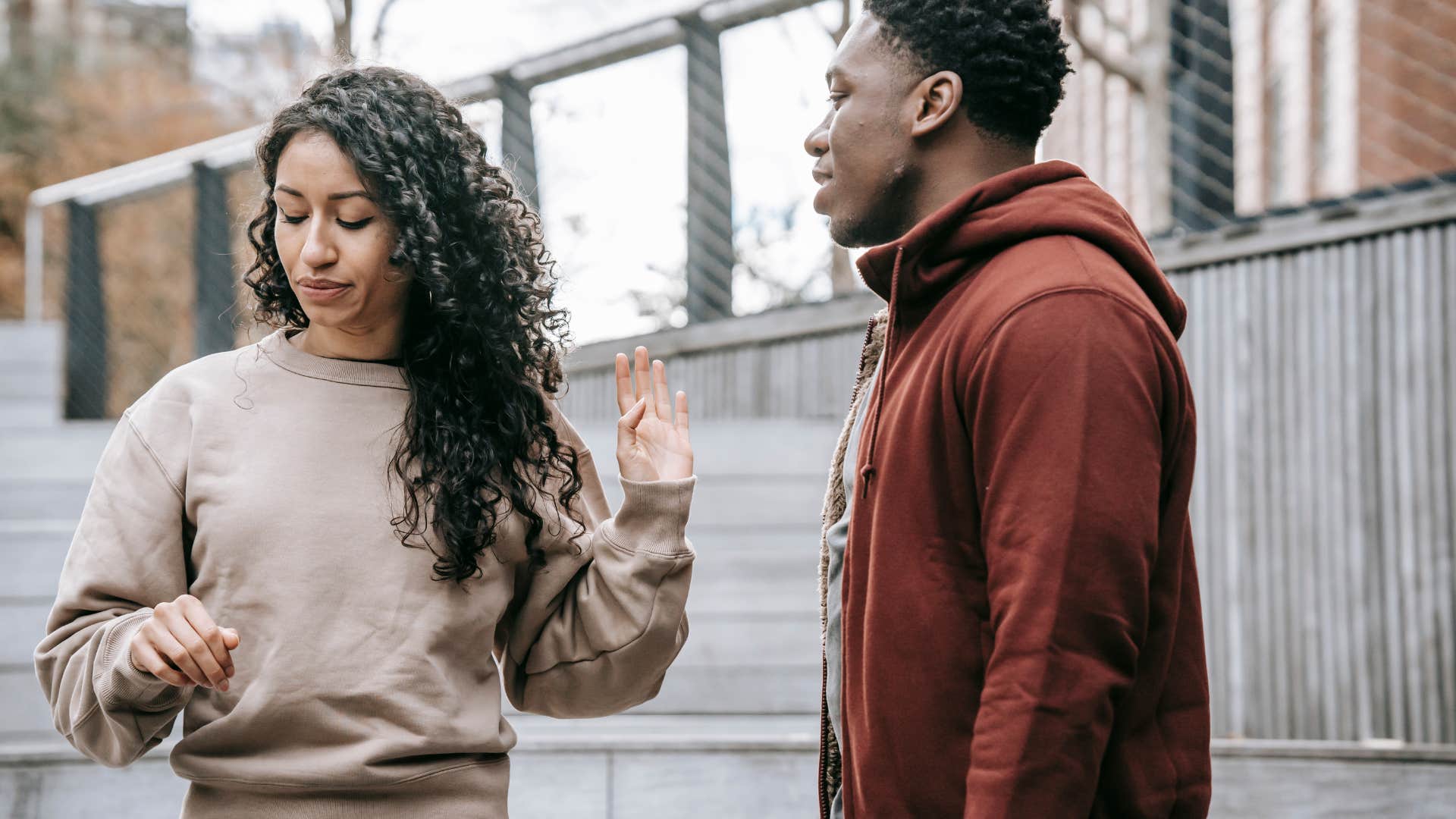11 Polite Gestures That Actually Come Across As Terribly Rude
Sometimes, our intentions don't align with other people's perceptions of our behavior.
 Nomad Pixel / Shutterstock
Nomad Pixel / Shutterstock Politeness is purely subjective. It is generally based on cultural or societal norms and is viewed from each person's own perspective. What might be considered kind and respectful to one person could be seen as offensive, condescending, or confusing by another.
Depending on the context, what we think of as polite gestures can actually come across as terribly rude. There are some universally polite behaviors, like saying please and thank you or not interrupting, but it's important to also be aware of some of the things you believe are appropriate but could be seen a dismissive, demeaning, or just plain rude to others.
Here are 11 polite gestures that actually come across as terribly rude
1. Tipping (or not tipping)
 RDNE Stock projects from Pexels via Canva
RDNE Stock projects from Pexels via Canva
Depending on where you are in the world, tipping or not tipping could be considered rude. For example, in the United States and Canada, tipping is normal and expected, while in places like Japan and South Korea, it is widely viewed as inappropriate. I can't count the number of online articles where commenters debated whether or not someone should be tipped.
In the US, if you fail to tip a person who provided good service, or even mediocre service, you might be seen as rude or ungrateful. Even when you decide to be polite and give a substantial tip, there will be people who view it as not enough and will dismiss your kind gesture. You might even be expected to give a gratuity in a case where the service is poor.
2. Direct eye contact
 SrdjanPav from Getty Images Signature via Canva
SrdjanPav from Getty Images Signature via Canva
If you had asked me years ago, I would have considered direct eye contact very polite. It seemed to be a way of showing that you were attentive and engaged in what another person was saying. It clarified communication and gave a feeling of transparency and honesty. The eyes are the windows to the soul, and by maintaining contact, you can build a stronger rapport with other people.
Then, I introduced my ex-husband to my dad. He approached my father with interest, looking directly into his eyes and hanging on his every word. After he left, my dad turned to me and said, "Why was he peering into my eyes like that? It was creepy." Instead of seeing it as a sincere interest in what he was saying, my father saw it as performative and an effort to find fault in his words. Some will view intense eye contact as a disrespectful attempt to intimidate them.
3. Calling elders by their first name
 Denisfilm from Getty Images via Canva
Denisfilm from Getty Images via Canva
When addressing others, the use of their first name indicates familiarity, an invitation to let their guard down and be vulnerable in the interaction. It can convey a sense of openness or closeness and make the atmosphere less hierarchical while making a person seem more approachable.
But referring to an elder by their first name may not have the intended impact. It could be seen as disrespectful and dismissive of their authority. It's generally considered polite to use formal titles like Mr., Ms., or Dr., or relationship terms like Mom, Dad, Aunt, Uncle when addressing someone older than you. Until you have been explicitly asked to call them by their first name, address them in those terms so you don't imply a lack of respect or seem overly familiar.
4. Giving someone a thumbs up
 wundervisuals from Getty Images Signature
wundervisuals from Getty Images Signature
In most cases, giving a thumbs up indicates agreement or encouragement. It lets another person know that they are on the right track and on the same page as you. It provides confirmation or validation with a nonverbal cue that is hard to misinterpret. It can make others feel seen or heard and could be interpreted as a compliment.
In other cases, a thumbs up can be taken as sarcasm. Who hasn't tucked their lips and given an overenthusiastic thumbs up to let someone know without a doubt that they were not feeling them? The exuberance given to a usually positive gesture is terribly rude and will be perceived as dismissive and conflictual.
5. Offering someone a piece of gum
 davidpereiras via Canva
davidpereiras via Canva
One of the first mean songs I learned when I was a kid was, "Sorry to be mean, but you need some Listerine. Not a sip. Not a swallow. But the whole entire bottle." It was a strong indicator that someone's breath was burning your eyebrows and nose hairs off, and they needed to do something about it expeditiously.
Offering a piece of gum can be seen as rude or polite depending on the circumstances. They say "a hit dog will holler," and if someone is very aware that they suffer from halitosis or chronic bad breath, they will assume that is why you're giving them gum. But others who don't have the same insecurity will see you as a nice person who doesn't mind sharing instead of chewing in their face.
6. Offering help that no one asked you for
 nicoletaionescu from Getty Images via Canva
nicoletaionescu from Getty Images via Canva
Lending a helping hand is polite in most cases. You've identified a need and know that you have the power or resources to meet it, so you do. You don't mind helping people who might be less fortunate than you are, and your helpfulness comes from empathy and compassion you feel for others.
But there will be times when you offer help based on assumptions that may not be true. For instance, someone has on grungy clothing, and you assume they are unhoused, so you offer a list of shelters they could stay in. It turns out you read them wrong, and now you have offended them or come off as rude by assuming they needed your unsolicited assistance.
7. Pointing at people
 AntonioGuillem from Getty Images Pro via Canva
AntonioGuillem from Getty Images Pro via Canva
It's helpful to be precise in whatever we are talking about. We want to clear up any confusion and make sure the person we are interacting with is looking in the right direction. It guides their attention and removes the need to explicitly describe something. Why over-explain when you can simply point something out?
But for the person being pointed at, this seems extremely rude. They immediately become self-conscious. It can also make the person feel exposed, blamed, threatened, or associated with accusations. They can assume that they are the topic of gossip or are being judged. In some cultures, pointing is even considered a direct attack or insult.
8. Turning down a gift
 Black Lollipop from Getty Images Signature
Black Lollipop from Getty Images Signature
There are many reasons you might turn down a gift. Maybe you don't feel you deserve it, or you didn't want a person to go out of their way to give it to you. You want to be polite and let them return it and keep the money they spent, so it's not an undue burden.
But for the person attempting to show gratitude and appreciation, your rejection of the gift they intentionally picked out just for you will be seen as rude. They might think you believe the present is beneath you or that you have a presumption that they cannot afford it. Either way, if someone has already gotten you something, it's better to take it than to send it back.
9. Smiling at strangers
 Jardul from Getty Images
Jardul from Getty Images
I was on the bus once, and there was a man sitting near the front who greeted every passenger who boarded with a broad smile. It seemed to lighten the mood on the bus, and everyone smiled back at first. Then another man got on the bus, and the gleeful stranger smiled at him brightly. His face frowned up, and he walked up to him and asked, "What do you find so funny?"
It was hard to understand what about an innocent smile had upset him. It turned out that despite that man's intention to spread good energy and be polite, the smile that he had pasted on his face came off as insincere and suspicious to the other passenger. He thought it was very rude and pretentious to grin at people when you didn't really mean it.
10. Laughing out loud
 stock_colors from Getty Images Signature
stock_colors from Getty Images Signature
A good old belly laugh can bring good vibes to the world around you. If someone cracks a funny joke and you find it hilarious, they feel accomplished and validated. In many situations, laughing out loud is contagious, causing others to join in without even knowing why they are laughing. It's like rolling out the welcome mat and inviting others to share in your joy.
But laughing loudly is rude to people who are uninvolved and unaware of what you find so hilarious. They get worried that you are laughing at them, not with them. They see your inability to regulate the noise you're making as a disruptive lack of self-control. Context absolutely matters, and if you laugh out loud in a serious situation, it will not go over well.
11. Being direct or saying no
 Keira Burton from Pixels
Keira Burton from Pixels
In our society, passive-aggressiveness is just a way of life. Some people prefer directness and believe it to be polite, honest, and transparent. They would rather you not beat around the bush and want you to say what you mean and mean what you say. Anything less is considered rude and disingenuous.
But being very direct or saying no can easily show up as rudeness to people who might be on the more sensitive side. They may prefer a more muted approach that takes the scenic route when getting to the point. Your ability to say exactly what you want and reject anything that does not serve you will rub them the wrong way.
NyRee Ausler is a writer from Seattle, Washington, and the author of seven books. She focuses on lifestyle and human interest stories that deliver informative and actionable guidance on interpersonal relationships, enlightenment, and self-discovery.

